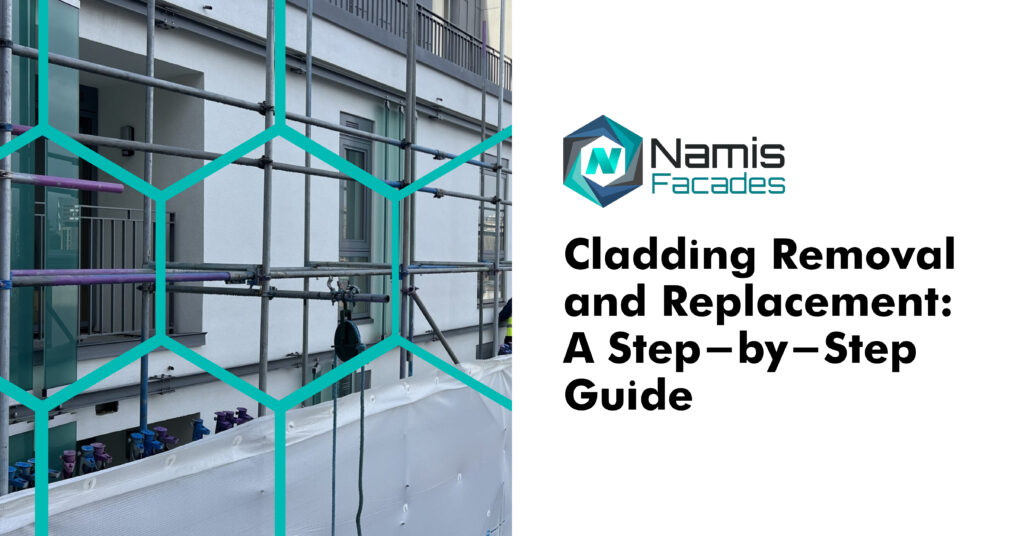Cladding Removal and Replacement: A Step-by-Step Guide

Cladding remediation is important for building safety in the UK. At Namis Facades, we remove unsafe cladding and replace it with fire-safe A1 rated mineral insulation systems. Let’s go through the steps of cladding removal and replacement to understand this safety procedure.
Key Takeaways
| Aspect | Details |
|---|---|
| Purpose | Ensure building safety and comply with new regulations |
| Process Steps | Assessment, Removal, Installation, Application, Finishing |
| Key Material | A1 rated mineral insulation (non-combustible) |
| System Used | External Wall Insulation (EWI) system |
| Post-Remediation | Regular maintenance and inspections required |
Why Cladding Remediation is Needed
After the Grenfell Tower fire in 2017, fire-safe cladding became very important. Many buildings now need to change their cladding to keep people safe and follow new rules. This sad event made everyone in the UK think about how safe buildings are, especially tall ones where people live.

The Building Safety Act 2022 made new rules to protect people living in buildings. This has led to many cladding change projects across the UK. The Act says it’s important to use materials that don’t burn easily and to make buildings as safe as possible.
Checking the Building and Making a Plan
Before we start work, we need to check the building carefully. This includes:
- Looking closely at the current cladding
- Checking for fire risks
- Making sure the building is strong enough for new cladding
- Creating a plan for each building
- Talking to people who live there to answer their questions
Our team at Namis Facades works with building owners to make a good plan that keeps everyone safe and doesn’t bother residents too much. We use special tools to understand what the building needs.
Taking Off the Old Cladding
Next, we carefully remove the old cladding that could catch fire. This needs skilled workers to do it safely and well. We take off the cladding without damaging the building.
We use special equipment to remove the cladding panels, insulation, and things that hold them on. We get rid of all the materials safely, following rules about protecting the environment. We often need to put up scaffolding and make sure workers and residents are safe.
Putting on New, Safe Insulation
After we take off the old cladding, we put on A1 rated mineral insulation. This material doesn’t burn and helps protect against fires. We put it on very carefully to make sure it covers everything and fits well.
This new insulation is good because:
- It doesn’t burn
- It keeps the building warm
- It helps block noise
- It lets air move so moisture doesn’t build up
- It lasts a long time
Our External Wall Insulation (EWI) system is designed to keep buildings safe and warm. We choose the right system for each building, thinking about things like weather and how tall the building is.
Putting on the EWI System
After the insulation, we put on our EWI system. This has several layers to make a strong, fire-resistant outside. Each layer does something important to make the cladding work well and be safe.

Our EWI system includes:
- Base coat: Helps the insulation stick and protects it
- Reinforcement mesh: Makes it stronger
- Primer: Helps the final layer stick better
- Finishing render: Protects from weather and makes it look nice
We put on each layer carefully to make sure it lasts a long time and looks good. We pay attention to corners, joints, and around windows to make sure everything is done well.
Final Touches and Checking Quality
At the end, we put on the final layer and check everything carefully. This is important to make the building look good and work well for a long time.

We offer different silicone thin coat render options to make the building look how you want, while still being safe from fire. We check everything very carefully to make sure it follows all the rules for buildings.
Taking Care of the Building After
After we finish replacing the cladding, it’s important to keep looking after it to make sure it stays safe and works well. We tell building owners and managers how to take care of the new cladding system.

We give advice on:
- Checking the building regularly to find and fix any problems early
- How to clean and take care of the cladding to keep it looking good and working well
- Checking the safety in the future to make sure it still follows the rules
- Keeping records to show the building is safe
Our facade restoration techniques help keep your building safe and looking good for a long time. We’re here to help if you have any questions after we finish the work.
Conclusion
Removing and replacing cladding is a big job, but it’s very important for keeping buildings safe. At Namis Facades, we work hard to do this job well, using safe materials and good systems. We do everything step-by-step to make sure the new cladding is safe, works well, and follows all the rules. It also makes the building look better and helps save energy.
If you’re worried about your building’s cladding or need help changing it, you can contact Namis Facades. We’re here to help you make your building safer for everyone living there. Our team can check your building, make a plan just for you, and do the work to the highest standards of safety and quality.
